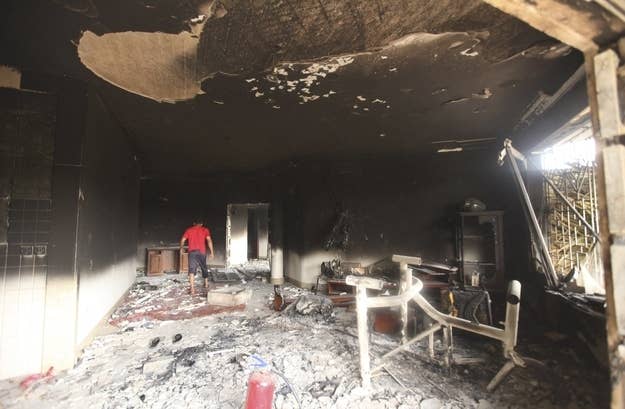
The State Department is denying charges it held up a security contract to protect the U.S. Ambassador in volatile post-conflict Libya.
On an appearance last night on Piers Morgan Tonight , former Romney and United Nations spokesperson Ric Grenell said he’d been told by State Department officials that Academi “was set to go in and provide security for the Ambassador in Libya.”
“They have been waiting,” Grenell said. “They've done some preliminary evaluations, but for two months, they have been waiting while the State Department decides to get the paperwork right."
A second source with ties to Foggy Bottom confirmed the substance of Grenell's account to BuzzFeed.
But State Department spokeswoman Victoria Nuland issued a blanket denial this morning of the claim that State Department red tape held up a contract with the firm.
"There is no truth to this," Victoria Nuland told BuzzFeed. "We are not working with any private security firm to provide services in Libya."
However, Nuland did not respond directly to Grenell's specific charges.
A spokesman for Academi, John Proctor, would not confirm or deny the “existence” of the contract. “The company doesn’t comment on specific contracts or operations as a general rule,” he said.
The exchange comes in the aftermath of the deadly assault in Benghazi, where an American ambassador was killed. Now, questions are being raised as to whether the State Department had adequate security measures in place to protect its staff.
One of the biggest questions: should Ambassador Chris Stevens, and the consulate in Benghazi, have had a larger security presence made up of Western private security contractors?
The answer is complicated, and hinges on a running debate about the contractors' role in American foreign policy. For one, details of what happened, and how the incident could have been prevented, are still murky.
The question also touches on the perennial debate in conflict and post-conflict security situations—low or high profile?
A high profile, more aggressive security posture can have the effect of inflaming local sentiment against Americans, thus making U.S. personel less safe in the long run. On the other hand, going the lower profile route makes one vulnerable to a dedicated and well planned attack.
The company formerly known as Blackwater has been at the heart of this debate, representing the more aggressive security posture.
During the Iraq War, Blackwater became the poster child for American foreign policy gone awry — arrogant mercenaries acting with impunity and outside the law.
For years, the U.S. Ambassador in Baghdad would travel with dozens of armored vehicles and scores of armed American private security guards wherever he went — including helicopters flying overhead.
This came to a head during a September 2007 shooting at Nissor Sqaure in Baghdad, where 17 Iraqi civilians were killed by Blackwater security guards escorting a convoy of US AID staffers.
The fallout was tremendous: because of Nissor square (and other scandals) Blackwater would be forced to change its name, first to Xe Services, and to its latest incarnation, Academi. Officially, Blackwater was banned from Iraq, and its founder, Erik Prince, left the U.S. to live in Abu Dhabi.
Yet for all its clear faults, Blackwater had never lost a “principal”—one of the individuals they were tasked to protect.
This post has been updated with an additional comment from State Department spokesperson Victoria Nuland.
